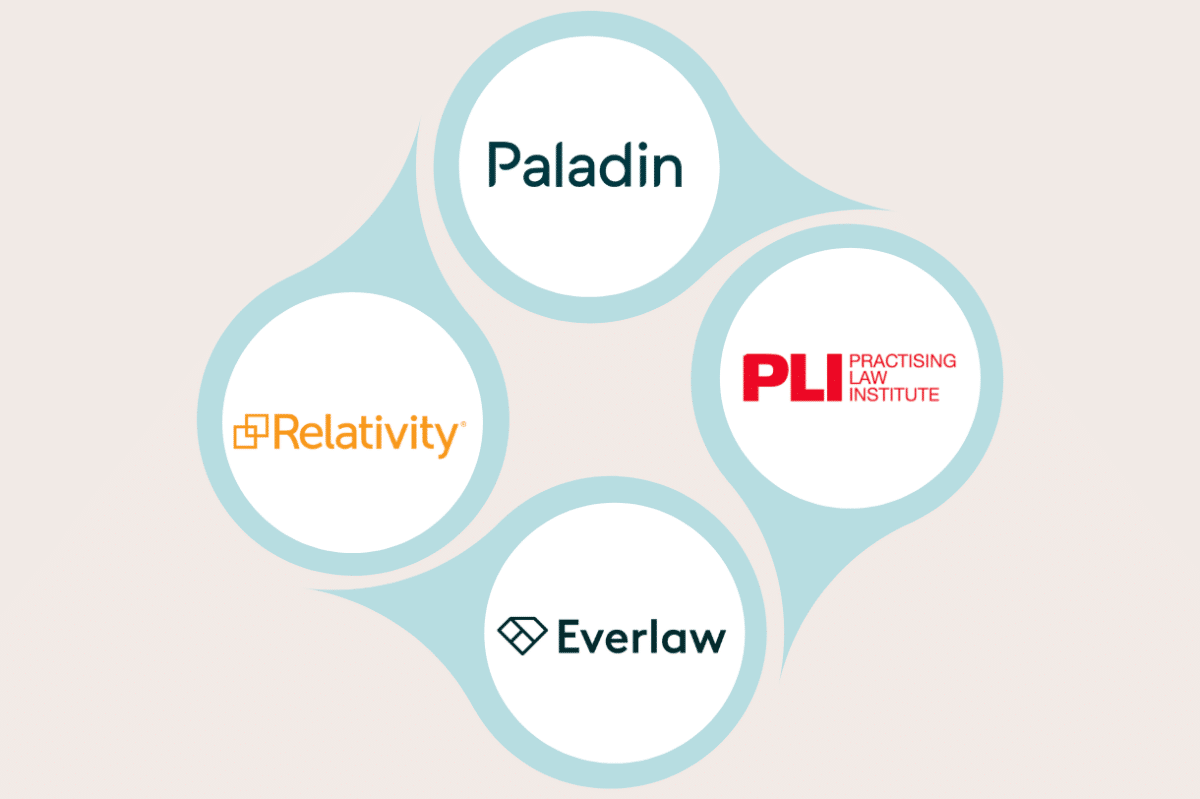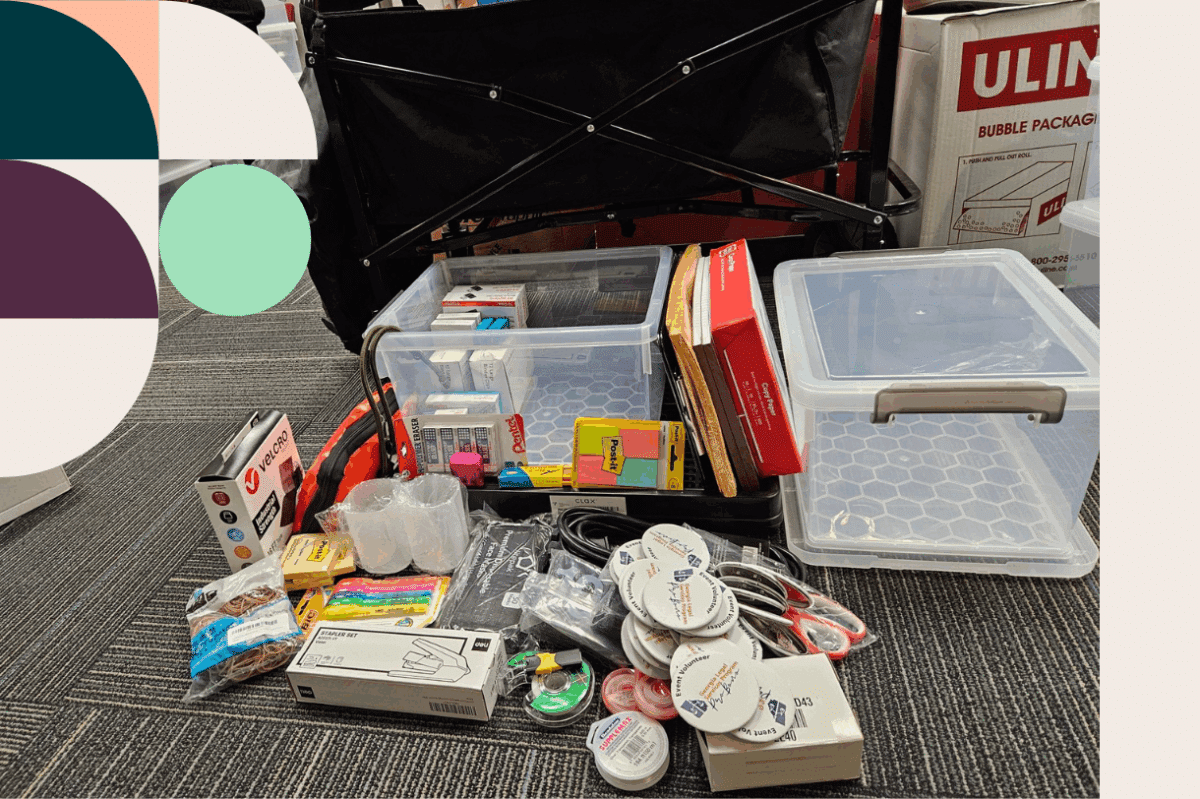The access to justice space is rapidly evolving with technology, creating new opportunities to support underrepresented communities. This article highlights four of the best tech products—Paladin, Relativity, Practising Law Institute, and Everlaw for Good—that offer free tools to legal services organizations to help expand their impact and better serve clients in need.
PALADIN
Paladin is the go-to platform for connecting the pro bono community and empowering legal teams to do more pro bono, more efficiently. Paladin launched in 2017 with internal pro bono opportunity databases for law firms and corporate in-house teams. Working in close collaboration with legal services organizations (LSOs), the company then developed a suite of tools that gave LSOs the ability to directly input, refer, and place pro bono cases through the Paladin platform. In alignment with Paladin’s mission of increasing access to justice, the LSO tools have been provided free of cost since day one. And since the release of the first version of our LSO tools, Paladin has continued to build on and advance its no-cost tech for LSOs.
Kristen Sonday, Paladin’s CEO, says, “It was clear to us from the beginning that legal services organizations should have free tools to manage their pro bono programs. LSOs are underfunded and under-resourced enough, and they deserve cutting-edge tools just like law firms have. To be in a position where we can provide that for free is really exciting, and I’m enthusiastic about building on that.”
In addition to pro bono matter referrals, the expansion of Paladin’s free tools has also enabled hundreds of LSOs to reach new law firms and lawyers for collaboration and relationship-building, bringing an additional layer of value to LSOs’ pro bono programs. We recently launched a tool that enables LSOs to display their public case list on their websites, helping to boost volunteer engagement and simplify the recruitment process.
Every day, Paladin’s free tools are facilitating pro bono assistance for refugees, veterans, formerly incarcerated people, domestic violence survivors, and vulnerable youth. Helping low-income people get access to free legal assistance is what drives Paladin’s innovation.
We’re proud to be a part of the pro bono ecosystem and to be providing a no-cost tech solution to the legal services community. We take our access to justice mission seriously: we’re committed to building and expanding our suite of tools for LSOs, and to keeping it all cost-free.
To get started, request a demo and we’ll reach out to connect.
RELATIVITY
Relativity is a global legal technology company that makes software to help users organize data, discover the truth and act on it. Its AI-powered cloud platform, RelativityOne, manages large volumes of data and quickly identifies key issues during litigation, investigations, regulatory requests, and data breach response. Trusted by law firms, corporations, the public sector, and legal service providers worldwide, RelativityOne empowers users to tackle legal data challenges of any type, on any scale.
Relativity launched Justice for Change in 2020 to empower those seeking to positively impact social justice in our communities. The Justice for Change program provides qualifying organizations with 500GB worth of RelativityOne use among 10 users over 24 months. The program emerged in the wake of civil unrest that underscored the reality of enduring injustice and oppression. Johnathan Hill, Relativity’s Global Program Manager for Social Impact and Community Engagement Lead, was instrumental in consulting with leadership and advocating for a program that leveraged Relativity’s unique capabilities to help make a difference. Recognizing that cost is a primary barrier in accessing much-needed technology for organizations doing crucial work around justice, Relativity identified a key opportunity area—enter, the Justice for Change program. “We wanted to eliminate cost as a barrier to access to justice work.”
“Providing access to this technology is a game changer in empowering those fighting for justice around the world,” says Phil Saunders, CEO of Relativity. “We are grateful for our participating law firms and partners that work directly with non-profit organizations and guide them throughout this process. We look forward to their ongoing efforts to improve access to justice as we work together to continue growing the program globally.”
Existing RelativityOne customers, such as law firms and service providers, can apply for free usage through the Justice for Change program to support partnered Legal Service Organizations (LSOs) on major pro bono projects. This means that LSOs can benefit from the program, even if they lack the capacity to onboard their staff to RelativityOne and use it directly. The designated hosting partner can work with the LSO to provide logistical and technical support via Relativity, with the firm’s costs waived for that pro bono project.
Through the Justice for Change program, Relativity also provides participants access to its latest and greatest generative AI solutions — including Relativity aiR for Review and Translate. Approved matters can utilize these AI-powered tools for up to 250,000 documents over 12 months, at no cost.
“By waiving costs, the pro bono attorneys can focus on the impact of the case,” says Johnathan. “We know that there needs to be an even playing field in justice, and tech is going to play a huge role in making that happen. This is how we invest in our community.”
When Relativity initially launched Justice for Change, it assumed most of the usage would focus on police misconduct cases. However, Relativity has seen a wide variety of matters, including tenants’ rights, Medicaid and Medicare challenges, prison overstays, child justice, and more. Since launching the program in 2020, there are now 200+ matters (cases and projects) globally, 7.3 million documents in Justice for Change workspaces under review, and over 90 organizations involved or directly benefiting from Relativity’s technology to enhance pro bono work.
Thanks to the Justice for Change program, the use of RelativityOne by organizations working hard to achieve just outcomes continues to grow on a global scale. Since its inception, the program has expanded beyond the U.S. to both Australia and Europe—and Relativity is eager to continue spreading the word about Justice for Change in hope of making an even bigger impact. “We are excited about the future,” says Johnathan. “Think about it this way: if 92% of civil cases have not been seen by a lawyer, imagine what’s possible.”
To share a success story: Justice for Change and Relativity’s ecosystem partner, Epiq, provided The Washington Lawyers’ Committee dedicated technical support to help investigate for their report, entitled “Targeted, Labeled, Criminalized: Early Findings on the District of Columbia’s Gang Database.” The report highlights that the District of Columbia Metropolitan Police Department’s Gang Tracking and Analysis System, the official name for the secret DC Gang Database, is inaccurate and racially discriminatory. The surveillance system lacked procedural safeguards for the civil liberties of DC’s Black and Brown residents. The authors aim to address its fundamental flaws and take immediate steps to reduce its racially disparate impact. The report sparked media discussion about the database’s unreliable intelligence, revealing that membership often reflects race and zip code more than criminality. The list of 1,951 labeled as “gang members” or “associates” frequently includes people without specific suspicion of criminal activity. Ultimately, the public scrutiny surrounding the problematic nature of the database led to a reduction in the database size by nearly 50 percent.
PRACTISING LAW INSTITUTE
Practising Law Institute is a nonprofit learning organization that provides the legal profession with continuous learning and professional development opportunities, including training for attorneys who provide pro bono legal services.
Pro bono is at the heart of PLI’s mission, and through its Scholarship and Pro Bono Membership programs the organization is able to grant access to thousands of hours of CLE to attorneys working in legal services or handling a case pro bono, at no cost.
PLI’s free “Pro Bono Membership” is available to 501(c)(3) organizations that have at least one attorney on staff and provide direct pro bono legal representation as their primary purpose. The membership provides unlimited access to a wide selection of live programming, as well as simultaneous and on-demand webcasts, One-Hour Briefings, and MP3s and MP4s.
The membership roster ranges from large statewide legal aid and legal services organizations with hundreds of attorneys on staff, to organizations with just one lawyer on staff. When the Pro Bono Membership program was first launched, the organization was required to have 10 lawyers on staff. That number was incrementally lowered, and now stands at one. Leonard McKenzie, Senior Manager of Scholarship & Pro Bono Membership, says this was adjusted to better serve the needs of legal services organizations, and the membership reflects that value. As examples, PLI supports an immigration organization with a single attorney on staff who supervises a team of legal professionals who conduct case intakes and a veterans’ organization that primarily focuses on intake and referral of pro bono cases to volunteer attorneys. All in all, over 890 legal services organizations across the country are Pro Bono Members, and Leonard says he’d like to see more organizations taking advantage of this benefit.
PLI provides resources that legal aid attorneys do not have access to in-house, says Leonard. CLEs taught by an expert faculty are available across all areas of law, and members can participate in any programming that interests them, whether it’s within their area of practice or not. PLI’s programming uses immersive, interactive technology to provide professional development for attorneys in foundational areas like time management, strategic listening, and implicit bias, as well as pro-bono focused topics such as managing vicarious trauma, defending immigration removal, consumer protection, civil rights, and children’s law.
Membership also includes a CLE credit tracker that logs each user’s participation in PLI courses and allows users to input credits from other providers. The tracker displays the user’s progress toward the required credits for their jurisdiction, including requirements in different areas, such as Professional Responsibility, Mental Health, or Legal Ethics. These trackers are kept up to date across all MCLE states, a tool which became particularly important during the pandemic, when lawyers needed to keep up with quickly changing CLE requirements.
It’s easy to get started – organizations simply fill out a one-page membership application to verify that they are a 501(c)(3) organization with at least one lawyer on staff. Then, the application is reviewed, and the prospective members have a phone call with a member of PLIs’ Pro Bono Team to discuss membership benefits and requirements. Once the organization is approved for membership, they must appoint an internal administrator to manage the user roster for the organization.
Once the organization is signed up for the Pro Bono Membership, the entire catalog of courses is available for staff attorneys to self-serve. Staff can sign up and take any courses they like, from in-person or live webcast CLE to on-demand recordings of past courses. Programs are also broken up into segments so busy attorneys can view whatever pieces are most relevant, or view in short bursts over time. A free mobile app also offers access to programs on-the-go and even offline, with customization settings that highlight content of interest to individual users.
PLI’s Scholarship Program offers full scholarships, registration fee waivers, and discounts to attend PLI programs. These are available to attorneys, paralegals, law librarians, and staff working for nonprofit/legal services organizations; pro bono attorneys/volunteers (providing no-fee legal assistance to clients individually or through a nonprofit organization); government attorneys; judges and judicial law clerks; law professors and law students; retired attorneys; independent/freelance paralegals; unemployed attorneys; and others with financial hardships.
PLI’s Interactive Learning Center offers on-demand resources for pro bono attorneys, such as training on best practices and ethics, interviewing clients, representing domestic violence survivors, and more. Legal services organizations, through their Pro Bono Membership, use these trainings when onboarding new staff attorneys as well as new pro bono attorneys. In addition, PLI has a dedicated pro bono team focused on creating new pro bono-specific programming and runs a train-the- trainer program for legal services organizations, to help LSOs provide better training for their volunteer attorneys.
Everlaw for Good
Everlaw for Good was founded on the belief that justice should be accessible to all, regardless of resources. The program aims to level the playing field in the legal system by providing nonprofit legal organizations, law firms handling pro bono matters, and investigative journalists with free and heavily discounted access to Everlaw’s powerful cloud-based ediscovery platform. By removing financial and operational barriers, Everlaw for Good enables legal teams to tackle complex cases with the same sophisticated tools used by the world’s largest firms.
Since its launch, Everlaw for Good has provided over $4 million in complimentary services, supporting more than 200 participating organizations and assisting with 500+ legal matters. The program serves a broad range of justice-driven initiatives, including legal services organizations, other nonprofits, pro bono matters at law firms, investigative journalism efforts, and academic research. Its focus areas are those outlined in the Pro Bono Institute’s definition of pro bono: low-income populations, human rights, civil rights, civil liberties, public rights, and environmental rights.
Through its initiative, Everlaw offers a free tier with no-cost access up to a generous monthly data cap, unlimited cases and user licenses, and powerful AI-driven tools to streamline document review and case preparation. Everlaw for Good users receive complimentary technical support and training, ensuring they can maximize the platform’s capabilities without additional overhead.
“At Everlaw, we believe that justice should not be a privilege reserved for those with the most resources,” said Joanne Sprague, Director of Everlaw for Good. “By making our platform available to nonprofits and pro bono practices at no cost, we empower them to take on complex cases with confidence and efficiency, ultimately advancing fairness in the legal system.”
For more information or to apply, visit Everlaw for Good or reach out to [email protected].
The access to justice technology space is growing rapidly, with immense potential to bring legal help to vulnerable people and underserved communities across the world. We’re glad to highlight just a few of the impactful resources that are available for free to legal services organizations.




